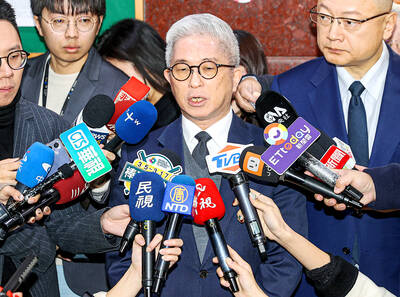Chen Shui-bian (
"I think party members will respect my thinking and direction in choosing a vice presidential candidate, because they realize the overriding situation the party faces," Chen said yesterday morning.
Chen attended two important meetings with Lu yesterday and met with party leaders in private to reduce any possible internal opposition.
Chen denied, however, that a final decision had been made.
He said that he would ask "all great people" at today's campaign rally in Taoyuan about the issue to help him choose the perfect partner.
Chen's campaign staff mem-bers said he originally had planned to announce his choice of Lu at the Taoyuan rally, but now, in order to reduce opposition from inside the party, he will wait until Sept. 28, the anniversary of the party.
Chen was invited by Lu to a breakfast meeting yesterday with former Australian Prime Minister Paul Keating in Taipei.
Afterwards, both of them attended a DPP lawmakers' caucus luncheon.
Instead of attacking those who opposed her, Lu downplayed the possibility that she would be Chen's choice.
"There are many tasks which are more important than the Chen-Lu ticket issue, such as international affairs," Lu said.
"The Chen-Lu ticket is not my business now and I will not comment it," she said.
"But I will firmly support Chen in the presidential election," she said.
"Some people say that Chen is only good at domestic affairs, but I think people will see that Chen also has a global view as well, especially if they could have heard his conversation with Mr. Keat-ing," Lu said.
Meanwhile, most DPP senior leaders shifted their tone from criticism to support of Chen's decision, saying the presidential candidate has the right to choose his running mate and party members should respect his decision.
Chen said the opinions of those who opposed the Chen-Lu ticket were based on their own high standards in choosing a candidate.
"I will still consult with party leaders on the issue, but I believe all my comrades will respect my final decision," Chen said.
Chen also visited DPP lawmaker Chou Po-lun (
Chou told reporters after meeting with Chen that the former Taipei mayor seems to have made up his mind about Lu, but that his opposition to the match would carry weight with other party members.
"As far as I know, there are more than 60 members of the party's legislative caucus who do not support the Chen-Lu ticket," Chou said.
"I am worried about those who did not voice their real feelings. They may not be giving their best for the Chen campaign," Chou said.
"At least I hope that my opinions will help let Lu realize the fact that she needs to improve her attitude and be less difficult with people," Chou said.

Conflict with Taiwan could leave China with “massive economic disruption, catastrophic military losses, significant social unrest, and devastating sanctions,” a US think tank said in a report released on Monday. The German Marshall Fund released a report titled If China Attacks Taiwan: The Consequences for China of “Minor Conflict” and “Major War” Scenarios. The report details the “massive” economic, military, social and international costs to China in the event of a minor conflict or major war with Taiwan, estimating that the Chinese People’s Liberation Army (PLA) could sustain losses of more than half of its active-duty ground forces, including 100,000 troops. Understanding Chinese

AGING: As of last month, people aged 65 or older accounted for 20.06 percent of the total population and the number of couples who got married fell by 18,685 from 2024 Taiwan has surpassed South Korea as the country least willing to have children, with an annual crude birthrate of 4.62 per 1,000 people, Ministry of the Interior data showed yesterday. The nation was previously ranked the second-lowest country in terms of total fertility rate, or the average number of children a woman has in her lifetime. However, South Korea’s fertility rate began to recover from 2023, with total fertility rate rising from 0.72 and estimated to reach 0.82 to 0.85 by last year, and the crude birthrate projected at 6.7 per 1,000 people. Japan’s crude birthrate was projected to fall below six,

WARNING: If the defense budget is not approved by the legislature, systems such as the Harpoon missile coastal defense system would be impacted, Hsu Szu-chien said The armed forces have response protocols for a wide range of sudden contingencies, including the “Wan Chun Plan” to protect the head of state, the Ministry of National Defense said yesterday. After US President Donald Trump on Saturday launched a series of airstrikes in Venezuela and kidnapped deposed Venezuelan president Nicolas Maduro, concerns have been raised as to whether China would launch a similar “decapitation strike” on Taiwan. The armed forces regularly coordinate with government agencies and practice drills to ensure preparedness for a wide range of scenarios, Vice Minister of National Defense Hsu Szu-chien (徐斯儉) told reporters before a meeting at

Russia sent a submarine to escort an empty oil tanker that the US military has been pursuing and attempting to seize for weeks, US media reported on Tuesday. The US has been chasing the oil tanker, formerly known as the Bella 1, since it evaded a US blockade around Venezuela and thwarted a US Coast Guard attempt to board it last month. Since being pursued by the US Coast Guard, the vessel has switched its registration to Russia, changed its name to the Marinera and the tanker’s crew reportedly painted a Russian flag on the tanker last month. It had been en route